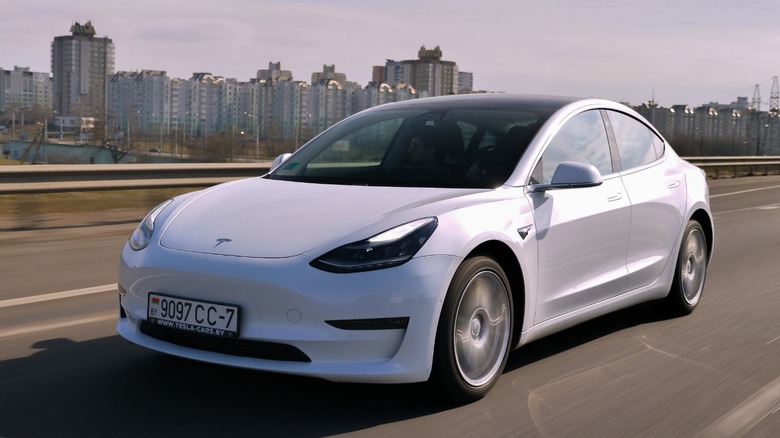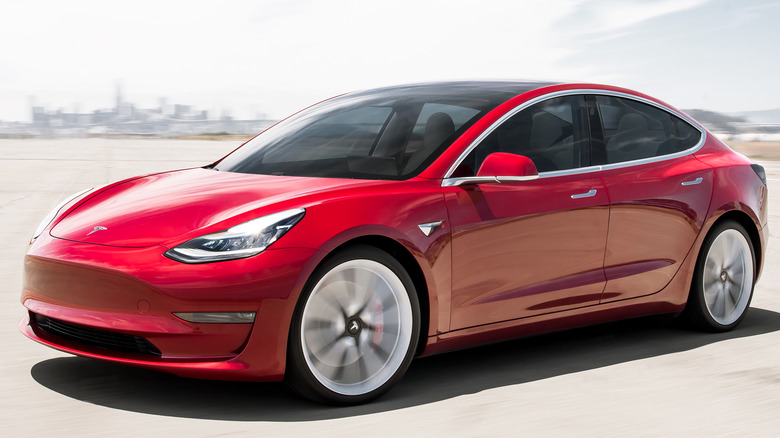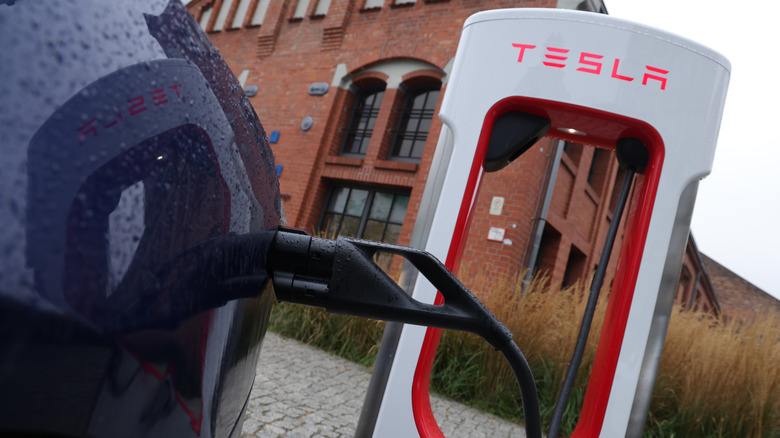Here's How Long A Tesla Model 3 Battery Will Actually Last
Gone are the days when most people thought of electric cars as ugly and sluggish. Now, consumers know EVs can be just as mainstream in their appearance as gasoline-powered vehicles. A large reason for this shift in thinking is the rise in the popularity of Tesla cars. Yes, these models are still in the minority on the road, but we see them far more than we once did. Despite this, many potential buyers still have questions about EVs that prevent them from going out to buy one.
Nowadays the biggest reservation people have when it comes to buying an EV such as a Tesla Model 3 isn't due to its appearance but rather concerns about the battery. Many consumers still have range anxiety, which remains one of the biggest reasons people report choosing to stick with gasoline-powered cars. As well, buyers often ask how long the battery itself will retain its capacity before needing to be replaced, something that can cost thousands of dollars. Fortunately, a growing body of data is reassuring for current and future Tesla buyers, revealing that owners should be able to easily hit six figures on the odometer while retaining a substantial battery capacity percentage.
How long will a Tesla Model 3 battery last on a single charge?
The most immediate concern potential drivers have when it comes to the battery is how long it will last on a single charge. This is because the range on a single charge impacts day-to-day life. People want to know that they can commute to work, run errands, and simply live life without having to worry about charging their Model 3. The simple answer to those concerns is that they can do all of those things with their Tesla Model 3. All Teslas get an average of 262 miles per charge, but the Model 3 Performance is particularly notable at 315 miles. Even better, if you have the long-range model, the average range on a single charge jumps to 353 miles (via Opti Watt).
Of course, as with any car, the range from your Model 3 is going to depend on a few things. First, how you drive the vehicle influences its range. For example, Ford explains that aggressive driving can cause your EV's range to dip, as maintaining slower and more steady speeds will increase efficiency — this is something that the U.S. Department of Energy recommends for conserving fuel in gas-powered vehicles as well. All of this impacts how far your Model 3 can go between charges, albeit by varying degrees. Road conditions also play a part, and this includes whether or not your path has hills or other inclines. Even something as simple as turning on an EV's climate control system can influence how many miles you can drive with your Model 3.
What's the lifespan of a Tesla Model 3 battery?
The big concern that people have in terms of buying a Tesla Model 3, or any other EV for that matter, is how long they can expect the battery to remain in good health — partly because they know that these batteries are more expensive than the ones found in gas-powered cars, but also because getting a Tesla mechanically worked on can be more of a hassle than getting a gas-powered car serviced. However, what people should know is that Tesla is building batteries to last (via Tesla). Most agree that these batteries will outlive the cars themselves.
In April 2019, Tesla CEO Elon Musk said in a tweet that the Model 3 EV's "drive unit & body is designed like a commercial truck for a million mile life." When looking at the battery specifically, he said the Model 3 battery modules "should last 300k to 500k miles" — that is, for 1,500 cycles. According to the U.S. DOT, Americans drove an average of 14,263 miles per year in 2019, meaning the Model 3's purported 300,000 to 500,000 battery module lifespan would work out to between 21 and 35 years of operation.
That's a reassuring number, as Musk said in the same tweet that it'll cost between $5,000 and $7,000 to replace a Model 3 battery module. Looking at the data that was available as of 2016, it seems a Tesla battery pack may be able to hit the 200,000-mile mark while still retaining 90% or more overall battery capacity, though there were some outliers in the data (via Electrek). This means that with extenuating instances aside, the Tesla Model 3 is a pretty safe bet in terms of the overall battery life.


